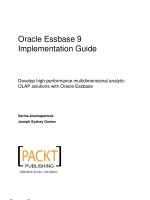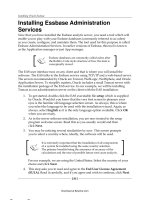Oracle Essbase 9 Implementation Guide- P62 pot
Bạn đang xem bản rút gọn của tài liệu. Xem và tải ngay bản đầy đủ của tài liệu tại đây (745.21 KB, 5 trang )
Getting the most out of the Microsoft Excel Add-in
[ 290 ]
Summary
Well, there you have it! In this chapter we have learned how you can generate
reports using the Essbase Add-in for Microsoft Excel or Visual Explorer or Essbase
Query Designer, as well as the capabilities of each type of reporting. What we
recommend now is to just start playing with the add-in. Try creating custom data
sheets by rst performing simple retrieves. Then, as you become more comfortable
and condent, you can begin setting up advanced row and column headings by
using the double-click and pivoting functions or by using the fully functional Essbase
Member Selection tool to populate your spreadsheet's row and column headings.
Once you've become adept at setting up good looking spreadsheets and reports,
you can start playing around with retrieving data into your sheets, then Locking
and Sending the data back to the database.
Next up, is how to automate your Essbase database system. We will show you
an assortment of functionality options included in your Essbase package that
allow you to automate routine tasks, from the very basic and menial, to the large
and complex. You can turn everyday chores into automatically running batch jobs
that do everything from dynamically adding dimension members to the database
outline, to loading and calculation data, to actually building presentation and
analysis cubes.
This material is copyright and is licensed for the sole use by Paul Corcorran on 5th July 2009
8601 ave. p #1, , lubbock, , 79423
Download at Boykma.Com
Automating your Essbase
Cube
If you've made it this far and you're still coherent, congratulations! Upto now there
has been a tremendous amount of information for you to absorb, all of it necessary.
With all that we have presented to you to this point you should be able to take your
Essbase journey from a complete installation to a fully functioning Essbase database.
Complimenting your fully functioning Essbase database is your knowledge of the
many ways to load and calculate the data in your Essbase database. You also have
a good understanding of how to utilize the powerful Essbase Add-in for Microsoft
Excel, allowing you to interact with your database and the data contained in it.
In this chapter you will learn that many of the routine tasks required to keep
your Essbase system functioning at its best can be automated. Further, many
of the routine administrative tasks can be automated and the functionality then
provided to your business customers so they can perform for themselves many
of the administrative duties that pertain to their business operations. Some of
these types of tasks include adding new users, granting permissions, executing
data loads, and running database calculations.
This chapter is divided into three main sections and each section speaks to a
different method that can be used to automate Essbase functions and commands.
This material is copyright and is licensed for the sole use by Paul Corcorran on 5th July 2009
8601 ave. p #1, , lubbock, , 79423
Download at Boykma.Com
Automating your Essbase Cube
[ 292 ]
In the rst section, we discuss the Essbase command scripts, or Ess-Commands, or
simply EssCmds. The Essbase command scripting functionality is a holdover from
the very earliest versions of Essbase and was rumored to be phased out completely
in Essbase versions higher than version 9.x. We have since found out that Essbase
version 11.x will now contain EssCmd functionality to give you more time to
convert your scripts to the newer MaxL scripting language. The new MaxL scripting
language has replaced EssCmd and provides superior functionality and ease of use.
Although we are covering Essbase command scripts here we recommend you use
the new MaxL scripting language and the Essbase API instead, especially if you are
developing a new system.
The second section is where we discuss the Essbase MaxL scripting language
which has been developed to not only replace the aging Essbase command
scripting language, but also offer enhanced functionality while providing less
cryptic and easier to use command words.
In the third section, we discuss the Essbase Application Programming Interface or
API. The Essbase API has evolved over the successive versions into a very powerful
set of tools for the developer. What top of the line application package does not
include a complete array of API tools? You just have to gure that Essbase would
have one of the best available.
The Essbase API can be accessed from Microsoft Visual Basic for Applications,
known as VBA, and included with all Microsoft Ofce components. The API
can also be accessed from Visual Basic and COM+ applications, and the API can
also be accessed from Java programs. All in all it is a very versatile and extremely
useful tool to have in your Essbase toolbox!
Essbase command scripts (EssCmd)
EssCmd is a command-line Essbase interface that can perform operations interactively
through a command-line window or through a batch or script le. EssCmd operates
independently of any other Essbase analytic services interface, including the EAS tool,
the Essbase add-in, or any custom-built application programs.
The Essbase command scripting language, affectionately known as Ess-Command or
just EssCmd, is a highly functional set of tools that are used to automate many tasks
in the world of Essbase. Although EssCmd has been phased out in the latest versions
of Essbase it's still a good idea that you become familiar with EssCmd and what
you can do with it. If you ever inherit an existing system that is still using an older
version of Essbase chances are that it will have lots of EssCmds in use.
This material is copyright and is licensed for the sole use by Paul Corcorran on 5th July 2009
8601 ave. p #1, , lubbock, , 79423
Download at Boykma.Com
Chapter 8
[ 293 ]
For starters an Essbase command script le object is actually an ASCII text le with
a le extension of .scr. As with all Essbase objects you must follow the naming
conventions we have previously discussed.
All Essbase le objects can be named using upto 8 characters,
can have no spaces in the name, and must be located in a
folder or directory path that does not contain spaces.
Creating an Essbase command script
There is only one way to create a usable EssCmd. Because an EssCmd le object
is actually an ASCII text le you can open any text editor and begin entering
commands. The text editor is also how you would modify an existing Essbase
command script.
Although there is no formal EssCmd script editor supplied with Essbase there is
comprehensive help included in the online help that is supplied with the EAS tool.
To access this excellent EssCmd resource simply click Help | Information Map
to open your web browser and bring up the following screenshot:
This material is copyright and is licensed for the sole use by Paul Corcorran on 5th July 2009
8601 ave. p #1, , lubbock, , 79423
Download at Boykma.Com
Automating your Essbase Cube
[ 294 ]
From the Essbase Administration Services Information Map screen, click
the Technical Reference link under the Reference column, to bring up the
following screenshot:
On the Technical Reference Overview screen you will see help topics listed for most
of the technical aspects of Essbase, its peripheral functions, and its services. From this
screen you can click on the EssCmd link to access step-by-step instructions on how
to create, edit, and execute an Essbase command script.
Begin by opening a blank text le and saving it with the
.scr le extension.
Please use these les with caution. In a Windows-based
system, a le with the .scr extension is usually associated
with a screensaver le type.
When opening an EssCmd le, it is best to open your text
editor and use the File | Open method to open an Essbase
command script.
This material is copyright and is licensed for the sole use by Paul Corcorran on 5th July 2009
8601 ave. p #1, , lubbock, , 79423
Download at Boykma.Com









